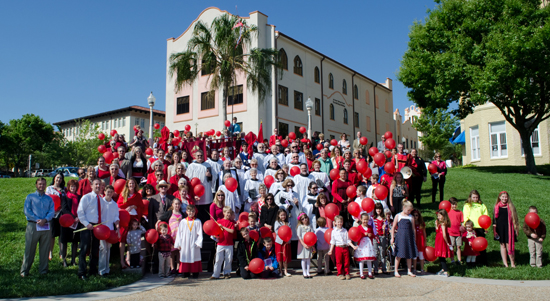 Based on All Saints’ Parish Academy Studies in Anglican Spirituality
Based on All Saints’ Parish Academy Studies in Anglican Spirituality
from
“What is Anglicanism” (1982, Morehouse Publishing) by The Very Rev. Urban T. Holmes, III, Ph.D.
Former Dean of the School of Theology, University of the South
and
“The Anglican Spiritual Tradition” (1983, Darton, Longman and Todd Ltd.) by The Rt. Rev. John R. H. Moorman, D.D.
Former Chancellor of Chichester Cathedral and IX Bishop of Ripon (Province of York)
What is an Anglican?
• a person rooted in the beliefs and practices of Christian churches which either have historical connections with the Church of England or maintain a liturgy compatible with it.
• a person who is the product of a montage of geographical, social, political, economic and racial forces that have created Anglican historical memory.
• a person who does not separate the sacred from the secular, the head from the heart, the individual from the community, the Protestant from the Catholic, the Word from the Sacrament.
What Anglicans Know About Their History?
• they know Anglicanism has very little to do with Henry VIII and his various wives. They believe what shaped Anglicanism in the past 400 years was Elizabeth I’s efforts to give meaning to reformed Catholicism, which is neither Roman nor Protestant. Anglicans continue to live in the spirit she established and that is conformity with no interference in the conscience of the people. Conformity means abiding by the rubrics of the BCP and being in church on Sundays and Holy Days to worship God. This has historically set the tone of Anglican life together.
• they know the Church of England gave birth to the Methodist Church - in an unintentional way. Rev. John Wesley was an evangelical Anglican priest who started bible study ‘methods’ that evolved into Methodism, a high church revival movement in the Anglican Church which ended up as a form of dissent - the largest and most influential in the land. Wesley, who remained Anglican, also started open air preaching and revivals where people showed extreme forms of emotionalism.
• As important as many hold the evangelical movement in the United States, they know the evangelical movement had its birth in the 1700’s Church of England when pietism was dominant in Anglicanism. This birth of evangelicalism was experiential in that every person 1) began with a sense of the horror of sin, 2) an acceptance of the Lord as Savior, and 3) a moment of conversion (some know the day and time) when the soul knew it was forgiven and that all sins were blotted out by the death of Christ on the Cross. This was 1) justification by faith and 2) the free gift of God through grace. It became the predominant Anglican way of thought for many generations until it was replaced almost entirely by the Oxford movement. For more history, see
http://www.anglican.org/church/ChurchHistory.html
What Anglicans Believe Concerning the Bible
• they believe that a Christian should adhere to the life and teachings of Jesus Christ as presented in the Bible.
• they believe the Bible is the church’s book and the task of the church is to enable the Scriptures to be heard as good news, calling them to see the world in a new way in which God is present, bringing them to wholeness.
• they believe the cultural conditioning of the books of the Bible by centuries long oral tradition and the editorial process - something like a montage, where different (biased) points of view & versions overlay one another, i.e.
Genesis 1:1-2:4 
& 2:5-25; the different interpretations of the experience of Jesus in the NT – Palestinian, Greek, Jewish, and Gentile.
• they understand that until modern times, every copy of the Bible was done by hand and they reflect the attitude of the copyists and that there are no autograph copies.
• they understand that the Bible reflects various literary genres of the times and that many contemporary anecdotes and aphorisms found their way into the accounts, i.e. Paul quoting a Greek playwright (Menander 342-291 B.C.), Jesus quoting common wisdom of the times, folk motifs. They believe these things do not threaten the authority of Scriptures.
• they do not believe the Bible is just like any other great literature.
• they do not believe that every word in the Bible was dictated by God.
• they believe there is no perfect text of the Bible.
• they believe that within the totality of Scriptures the story of God’s love for humankind confronts us, convicts us of our sin, and calls us to a new life. This is why they believe in PLENARY inspiration rather than VERBAL inspiration of the Bible. This means they believe all Scripture is equally-inspired, though it admittedly may not all seem equally inspiring to the reader. Therefore, they 1) do not take verses out of context to “prove” a particular point, so they believe the bible is to be read “intelligently” and as a “whole” (in context) and 2) do not pick and choose texts when preaching and teaching to support personal interests. • they believe that the Bible should be read and heard in course, in order that those in worship may listen to the story in its entirety.
• their manner of listening to the Bible is by intentive intuition whereby they wait upon (not on) God to speak to them through God’s words.
• they believe the prevailing literary form of the Bible is story and poetry.
• they believe the Bible is the record of God’s personal disclosure of Himself to humankind.
• they believe the Holy Spirit opens the meaning of Scriptures through years of pondering texts and thoughtfully drawing out meaning by a person -
• • • understanding the words, i.e. when written and why
• • • understanding the author
• • • understanding themself, i.e. their world and place in it
• • • understanding their interpretation in the larger dialogue
• they believe that Scripture is “the” fundamental source of authority for the church; but, apart from reason it is dangerous. They believe Scripture w/o reason becomes a mirror for a misdirected person to project his or her own opinion(s), giving them the authority of God.
• they believe God continues to reveal himself in a manner that enlarges upon what is found in Scripture and in a way that is consistent with the church’s understanding. An example is the doctrine of the Trinity, not found in the Bible.
What is the Doctrine of an Anglican?
• their core doctrine is the Incarnation of Christ [meaning the goodness of material world and sensuality (God’s creation), a sacramental view of the material world as doorway to the divine, a tendency at times towards the Orthodox doctrine of theosis or deification - God became human so that humans might become divine] emphasizing their participation in the life of God.
• they participate in a community of faith by their baptism.
• they are devoted to God through the care and concern for others.
• they participate in the life of God through Holy Eucharist. Eucharist means "thanksgiving" and a Holy Eucharist is the principal form of Anglican worship. It is composed of two parts - the Word, which is the first half of the worship service, and the Holy Communion (Lord's Supper), which is the second half of the worship service. Anglicans believe there is a proper way to enter worship and a proper way to leave worship.
• they are more mystical than pietistic. [Pietism refers to a spirituality involving an acute, immediate, life-changing experience of God. Mystical refers to a slow journey to union with God. This person sees the union with God as the end of an ascent, requiring discipline, purgation, study, emptying and patience.] . Mysticism is more at home among Anglicans than Pietism (Reformed notions of election and emotional consolation) because Anglicans are more prone to look beyond the things visible to things invisible and not to things juridical. The inner mystical journey or pilgrimage has to be tempered by a commitment to the church to be healthy.
• they tend to be intuitive, analogical, metaphorical, symbolic - characteristic of poetry, art, and music.
• they take into account the whole of an experience, ambiguity and all, in their reasoning.
• they compare the nature of their answers to the character of God and His will for them.
• they consider the chaos of life with intuition, imagination, and feeling.
• they, by nature, defend themselves with the obscure and a fascination with the past.
• they acknowledge the metaphorical nature of religious conversion and theological discourse.
• they believe God makes himself known in the ordinary routine of life.
• their consciousness has the priority of the dialectic quest (comprehensiveness) over precision and immediate closure and the sense of a community of thought as opposed to a well-defined, definitive position.
• they accept the sciences and believe there is a continuity between nature and supernature.
• they believe they are brought into relationship with God by God’s initiative, not by their own efforts, thus they emphasize the immanence of God as well as His transcendence.
• they believe 1) the Bible is the only infallible source of authority for faith and practice, 2) salvation is the gift of God, 3) a sinner is justified before God by faith alone, 4) Jesus Christ is only proper object of faith, and 5) it is God alone who belongs at the center of our thoughts and world view.
• they value the Thirty-Nine Articles in the BCP as an official statement of Anglican thought, the Anglican platform on orthodoxy, and the test of faith.
• they are people of the “middle way” or Via Media, that is they are spiritually defined between those things Roman Catholic and those things of the Reformed tradition, thus not totally defined in their spirituality by either.
• they know William Porcher DuBose was the most original theologian Anglicans in the Episcopal Church have ever produced.
• they do not believe in predestination as some people, being foreordained to heaven and others to Hell before all time. They believe that all humankind is potentially capable of wholeness…a journey of wounded healers, bringing to others the presence of God that they themselves need.
• they believe the qualities of a healthy Anglican spirituality begins with a) a spirituality that is rooted in a receptive consciousness; b) a spirituality that grows out of liturgical prayer steeped in the Book of Common Prayer, which frees people from the impoverishment of popular religion; c) a spirituality which draws on Biblical imagery, which opens people's eyes and stimulates their imaginations to see God as He has not been seen before; d) a spirituality that is collaborative, so there is a healthy tension between collective truth (the church's history) and individual insight - which requires people to be secure in their prayer life and open to the offerings of the past and those around them.
What Defines an Anglican’s Worship?
• they believe in the real presence of Christ in the Lord’s Supper by memorial (do this in ‘remembrance’ of me).
• they believe that one should, but is not required, to receive both the bread and the wine in Holy Communion.
• they do not believe in the invocation of saints.
• they believe in corporate confession in worship and private confession, if needed and desired.
• they believe in a diversity of liturgical expression within the rubrics of the latest Book of Common Prayer.
• they believe the laity should be involved in the worship of the church and that the four instruments of worship are the Bible, Book of Common Prayer, sermons, and hymns.
• they believe worship should be according to the Book of Common Prayer, which they believe is Catholic in its essentials and Reformed in its nature.
• they believe every church has its own worship style and that no two churches are or have to be alike. They normally select their Cathedral, parish, or mission based on their worship style preference – if that option is available.
• they have a sacramental, historical (church year), and organized/controlled view of worship and believe in preserving the dignity, decorum, and reverence of worship – thus adding beauty to it.
• they believe that out of the sacraments springs the possibility of lives changed by an intimacy with God (active relationship) at the deepest levels. They believe sacraments are the ‘windows’ to the ever present God and church life is built on baptism and Holy Eucharist. They do not believe the sacraments limit God’s action.
• they believe that at the heart of the church’s sacramental theology is participation by means of symbols for each sacrament – bread, wine, etc. – in the Passion of Christ, from which all sacraments get their life.
• they believe that baptism lies at the root of the church’s sacramental life. It is the initiation of the Christian into the family (community) of God. It brings people into the ministry of the church, making all baptized Christians ‘ministers’. This is why Anglicans do not call clergy ‘ministers’, because they think they are all ministers. Anglicans know the clergy by their orders – bishops, priests, and deacons.
• they believe in the baptism of infants because they are a community of faith and infants do not have to wait until they can make a decision to be a part of it. Anglicans believe the journey to Confirmation is their route to a decision for Christ. They believe this is based on God’s actions (Incarnation) in community.
• they believe Holy Eucharist is the food of the saints and it makes present the sacrifice of Christ on behalf of all people. They believe God’s offer of freedom becomes actualized in Jesus and is fulfilled in his death and resurrection. By their participation in Holy Eucharist, they share in the effects of Christ’s sacrifice.
• they believe efforts to explain how Christ is present in Holy Eucharist is alien to them because symbols and the Incarnation are larger than explanation.
• they believe liturgy is the church’s ritual and without ritual they would lack a significant source of meaning in its life. Ritual, for them, is the repetitive enactment of the symbols of that event which called the community into being so that event is present with power.
• they believe liturgy has symbolic relevance, the ability to engage them at a level of their consciousness which awakens their sensibility (receptive form of thought). This brings them to a place where they can hear God at the depth of their being. It is more likely to be fearful and make them uncomfortable instead of giving them good feelings and a sense of security (consolations), because it awakens the reality of the Passion of Christ within them.
• they believe Books of Common Prayer change because each age has to appropriate the Prayer Book for itself and the reason is that liturgy is the expression of the experience of God for people at various times. They believe the present BCP reflects the current age and older prayer books reflect the memory of the church.
• they are deeply committed to the participation of the entire congregation in worship. They believe worship is a work of orders together in harmony with the BCP. Therefore, their worship spaces are not called stages and auditoriums. Those who lead worship are not performers and entertainers.
• they believe the Holy Eucharist (remembrance of Christ’s sacrifice) is the principal service of worship on Sunday and Holy Days.
• they believe silence is an important part of worship because it invites people to be at home and intimate in what is being said and done.
• they do not expect clergy to preach for a “decision” because Anglicanism is a reformed Catholic tradition, not a revivalist tradition. Rather, they believe clergy preach for insight that requires the abilities to listen and think intuitively.
• they believe preaching should be less dogmatic (inflexible, rigid) and more about a relationship with God, less on a life of biblical laws (juridical) and more on a friendship with God.
• they believe that the danger to Anglican worship is that it can become precious by being trapped in the whelms of liturgical preferences of the past or the gimmickery/foolishness/sloppiness of/in liturgy that is not appropriate to the drama of good liturgy.
What Do Anglicans Believe About Clergy?
• they believe that clergy can be married.
• they believe clergy should be properly educated and have seasoned life experience before being ordained..
• they believe that the bishop is the embodiment, the real symbol, of the universality of the church and the church is the primordial sacrament of Christ, which transcends time and place. The church therefore is a historical incarnation of the eternal Lord in all times and places. This is symbolized in the office of bishop. This makes the presence of a bishop trans-historical reality.
• they believe a bishop is called to speak out of the universal experience of the church. They also believe that a bishop is also called to guard Christian belief and has the responsibility, therefore, to exercise discipline.
• they believe that every parish and mission in a diocese is the bishop’s church and rectors and vicars serve as the bishop’s representatives.
• they believe that priests and deacons are a derivative of the episcopacy. This means their ministry is an extension of the Bishop’s and all three are an embodiment of the transcendent Word.
• they believe there are four orders of ministry – bishops, priest, deacons, and laity.
• they believe authority flows both from the church and from God and is rendered incarnate in the life and ministry of the bishop. Where the bishop is, they believe there is the church in its fullness.
• they believe that even though they have the episcopate, the episcopate does not guarantee they are doing the Lord’s work. An example would be electing a bishop who pleases (rather than challenging and leading) them, which has often, historically, driven the church into mediocrity and decline.
What Do Anglicans Believe About the Church?
• they believe the church ‘active’ (rather than gathered & passive) is the primordial sacrament of Christ, where He is particularly available and operative. Community, rather than the individual, is the fundamental material reality for the embodiment of the Spirit. So, they believe their church is their spiritual home and it should be kept in excellent condition.
• they believe the church is not synonymous with the Kingdom of God, because it is a human institution, rife with sin.
• they believe ‘authority’ in the Church is determined by a ‘dialogue’ between Scripture, tradition, and reason.
• they believe tests of orthodoxy are foreign to them whereas the sincere pursuit of truth done collaboratively, making it a spiritual exercise to which God speaks for those willing to hear, is a more correct relationship in the church.
• they believe a Council is when the church gathers to reflect on the Scriptures, in light of the tradition, to conclude what is a reasonable position. They believe a Council is authoritative only if there is consent of the faithful to what is declared. They believe that love must be known and shared in every aspect of life - which means the church is not isolated from the rest of life.
What Do Anglicans Believe About Pastoral Care?
• they believe they are called to share authentic love, which is a power which challenges, admonishes, confronts, supports, praises and comforts.
• they believe that when a person turns to Christ, they are transformed by being soaked in the Gospel and the sacraments act in the conversion process as focal points of a spiritual life lived in relationship with Christ.
• they believe the fundamental pastoral sacraments are Reconciliation and Unction (Healing).
• they believe that in private Confession – “all may confess, no one has to, and some should.”
• they believe that a priest cannot be an effective pastor to large numbers of people.
• they believe that the clergy should visit the people where they live and work and that every member of a parish or mission has the right to expect it. In this way, they believe the clergy are living persons to their people, transparent and vulnerable.
• they believe pastoral care is a spiritual art which requires that the clergy let people discover their holiness in the broken and fallible witness of their lives. It is an experience that cannot be done without pain as it requires faith and sacrifice.
• they believe the church should care for them throughout life – especially in birth, baptism, confirmation, marriage, maturation and death.
What Do Anglicans Believe About Missions?
• they believe mission is the activity of the church as the church, not a loose confederation of individuals formed into a society or charity with vast stores of wealth. They believe their task is not to send out a person to obtain “conversion experiences” in other individuals. They believe their task is to seek conversion to an understanding of a people’s life and culture as fulfilled in Christ.
• they believe in mission by identification and participation with those they wish to serve.
• they believe that mission must be by education of others so that they become more open to the Gospel.
What Do Anglicans Believe About Church and State?
• they believe that government, although imperfect, is an instrument of God's purpose and it has a responsibility for establishing a climate where the Spirit may do its work among the people.
• they believe it is improper to think that Christian commitment is only a matter of private conscience and the political realm is not one's concern.
• they believe God can use politics for His own ends and that being a politician is a worthy calling. Plus, they do not think the political process is necessarily corrupt.
• they believe the church is charged with speaking on behalf of the Gospel to the government.
• they believe Christians are called to a higher obedience than the law of the state and civil disobedience is appropriate, and sometimes required, in the face of overt, political evil, when all legal means of redress are blocked.
• they believe they should vote their religious conscience, but they do not believe ethical questions are at all times reducible to black and white norms of conduct.
• they do not believe in their country, right or wrong, because they consider themselves pilgrims who want a government that will support their journey to the Kingdom of God.
What Do Anglicans Believe About Their Witness to the World?
• they believe they are called to serve in a community. This means they believe it is the people of God who provide comprehensive ministry, not an individual.
• they believe the biblical concept of the Kingdom calls for a ministry to the suffering, the imprisoned, the oppressed, the hungry, and whomever is dehumanized by an unjust society.
• they believe they are interconnected with all people and have a responsibility to all people.
• they believe faith and belief are ultimately measured at the bar of justice. Therefore, they believe they are to live in the world as God sees the world and that means to relieve the burden of all who suffer, as far as one is able.
 Based on All Saints’ Parish Academy Studies in Anglican Spirituality
Based on All Saints’ Parish Academy Studies in Anglican Spirituality & 2:5-25; the different interpretations of the experience of Jesus in the NT – Palestinian, Greek, Jewish, and Gentile.
& 2:5-25; the different interpretations of the experience of Jesus in the NT – Palestinian, Greek, Jewish, and Gentile.
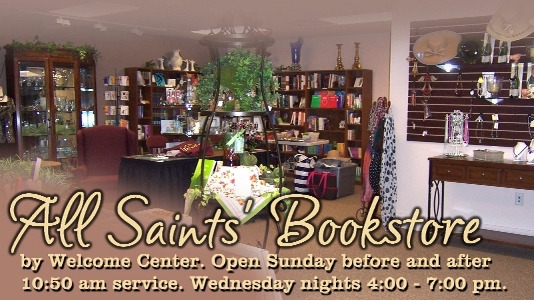 The Bookstore and Gift Shoppe is located next to the lobby of our Welcome Center.
The Bookstore and Gift Shoppe is located next to the lobby of our Welcome Center.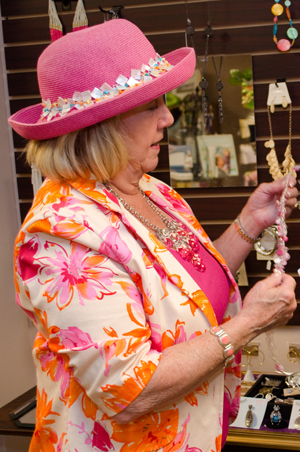




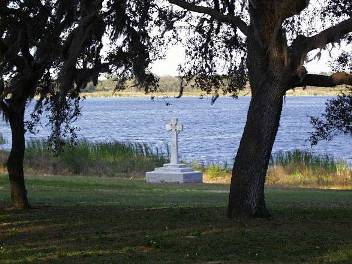
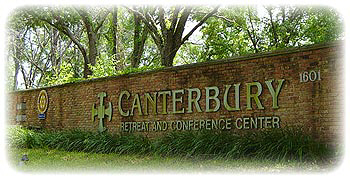
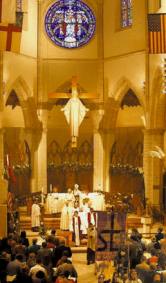
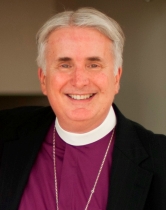
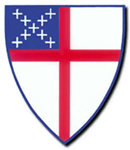
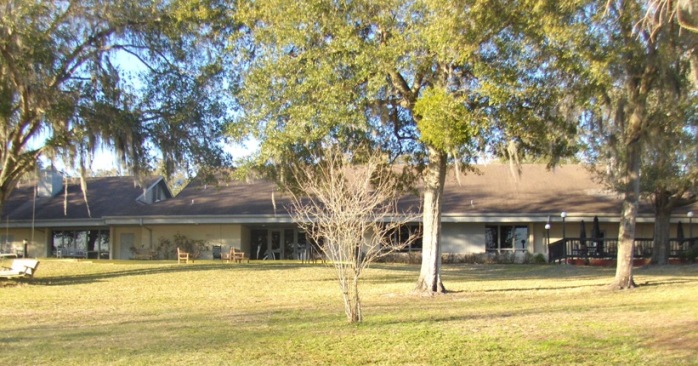


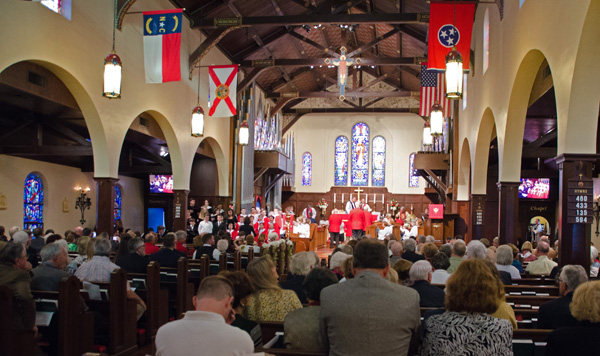
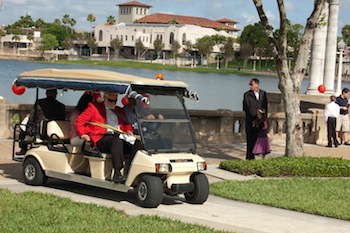 All visitors are our honored guests. If you would like a tour of the church during your visit, please let the clergy know ahead of time when you’ll be visiting, and they’ll schedule a time after worship to give you a tour of the church and introduce you to our family.
All visitors are our honored guests. If you would like a tour of the church during your visit, please let the clergy know ahead of time when you’ll be visiting, and they’ll schedule a time after worship to give you a tour of the church and introduce you to our family. All Saints' worship involves the congregation. In the pews, you will find the Book of Common Prayer, the use of which enables the congregation to share fully in worship. We also have Bibles in the pews for study and reflection.
All Saints' worship involves the congregation. In the pews, you will find the Book of Common Prayer, the use of which enables the congregation to share fully in worship. We also have Bibles in the pews for study and reflection.